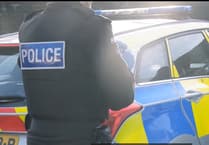The Chief Constable has used his final annual report to warn of a potential crisis facing the police force as officers face a real-term pay cut.
Gary Roberts is due to retire at the end of the year after 10 years as the island’s police chief.
In his opening remarks addressed to Justice and Home Affairs Minister Jane Poole-Wilson, Mr Roberts praised his officers as ‘remarkable public servants’.
However, he added: ‘I worry for their future, though: police officers have had a real terms pay cut of close to 20% over the last decade or so and life is really difficult for many young officers, who now have little disposable income and few chances of establishing themselves on the housing ladder.
‘Without change, a crisis may emerge.’
For context, student constables start on £24,000, with Mr Roberts saying ‘many young officers cannot find their way onto the housing ladder’.
However, this issue is not isolated to young officers, with more officers, including sergeants, telling Mr Roberts that they are struggling with some being left with little or no disposable income, and struggling to afford a social life or afford dental treatment.
He added: ‘I accept that very many people are suffering because of the lasting effects of the pandemic and because of inflation, but the damaging consequences of low police pay could be felt across the community for a long time.
‘Fewer officers, fewer good officers, poor morale and even, in a worst-case scenario, corruption were all unintended consequences the last time police pay fell in real terms, which was in the 1970s.’
He also used his report to warn politicians that while it could be tempting to cut the policing budget, this would only serve to cut local policing, with the impact being felt most by young and vulnerable people.
Furthering these points, the Chief Constable said that the police’s two recruitment drives across the year were a success.
‘Despite the low pay being offered to new recruits, high-calibre candidates came forward,’ he said.
He added: ‘The new officers were recruited almost exclusively to replace officers who have retired on schedule, as the number of unexpected departures was considerably lower than anticipated. Indeed, retention rates during the last two years have been considerably better than in the previous three or four years.’
For some time, changes to the pension system had made the island less attractive to transferees due to the ending of long-standing reciprocal arrangements.
However, Mr Roberts said that recent legal challenges to pension reforms in the United Kingdom ‘will benefit us here in that transferring will again become an attractive option’.
Mr Roberts has also warned that while the police have continued to meet its budgetary targets, new costs, such as drug wipes which cost £14 each and off-island testing which costs upwards of £600, will contribute to the forensic science budget for 2022-23 being overspent for the first quarter of the year.
He added: ‘The Isle of Man Constabulary is undoubtedly financially disciplined, but the future does not look to be very encouraging, with the twin threats of poorer government finances because of Covid-19 and high levels of inflation posing a genuine threat to how the constabulary operates.’
All told, Mr Roberts said the year was unremarkable for the police. Crime fell by 6%, the detection rate rose by 3% and burglary fell by 40% to its lowest levels in decades.
The Chief Constable said that the 18% increase in reports of sexual offences ‘was driven by increasing numbers of people who had the confidence to come forward’. He added that this equates to fewer than two reports a week.
He added: ‘Progress to establish a sexual assault referral centre (SARC) has been slow, with the Covid-19 pandemic being partly to blame. However, during the 2021-22 year a specialist doctor was employed on a full-time basis to provide a service to those who have been raped or sexually assaulted.
‘This was a major step forward and, with the SARC likely to become operational in 2023, the service that victims and survivors will receive will be as good as it can be.
‘Experience elsewhere suggests that the opening of the SARC will lead to something like a doubling in reports.’
However, the detection rate for rape in the year 2021-22 fell to just 5%.
While this is still higher than the UK average, Mr Roberts said that ‘for several years the Isle of Man Constabulary has detected about 20% of all rapes reported to it’.
Accepting that this may cause alarm, Mr Roberts has broken down the 26 reported rapes for the year 2021-22, of which 10 remained under investigation.
victims
Of the remaining 16, in four cases the victims did not wish there to be a prosecution; in three cases there was evidence to show that the complainant had not told the truth and in one of these there was a prosecution for doing an act against justice; in one case an offender had died and in another, the victim was too ill for the matter to proceed.
In five of the other cases, the police investigation discovered a suspect and the Attorney General decided that charges were not to be brought. In the remaining two cases there were too many investigative difficulties for a suspect to be identified or for a case to proceed.
The year also saw a ‘significant upturn’ in the offending and reoffending by teenagers under the age of 18, with 675 offences recorded, all committed by 224 young people.
Of these 675 offences, 275 were committed by only 15 boys and one girl.
Mr Roberts said: ‘Of the 16, 15 were boys, 13 had some form of a recorded mental health problem; 11 had been known to use illegal drugs and two were known for their abuse of alcohol.’
There was also a marked increase in violent offences (50%) by young offenders, with over half of assaults on police officers throughout the year being carried out by juveniles.
The island remains a lucrative market for, predominantly Merseyside-based, crime gangs.
Throughout the year, despite several high-profile cases, the number of drug seizures and the volume of drugs seized fell during the year.
Mr Roberts said: ‘The reduction in the value of drugs seized is perhaps only indicative of a change in police tactics, with greater emphasis being placed on disrupting activity, as opposed to trying over long periods to seize drugs.
‘Nevertheless, the island clearly has a drugs problem and it is particularly noteworthy that the amount of heroin seized increased tenfold.’


-(1).jpeg?width=209&height=140&crop=209:145,smart&quality=75)
.jpg?width=209&height=140&crop=209:145,smart&quality=75)

Comments
This article has no comments yet. Be the first to leave a comment.